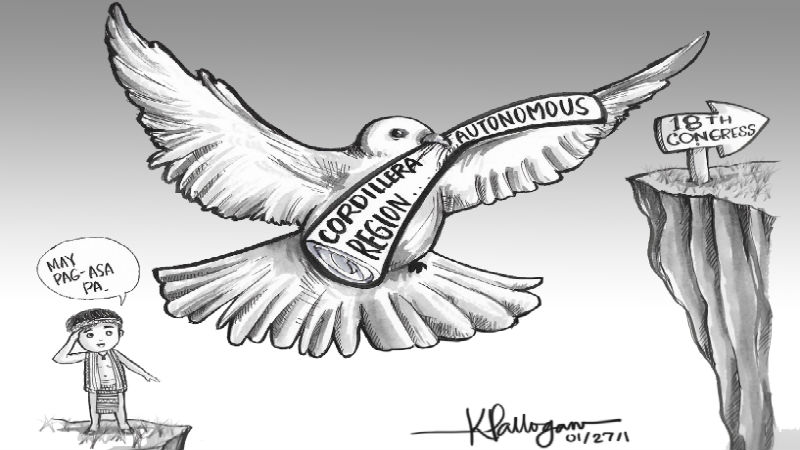The 17th Congress is about to end its session but House Bill (HB) 5343 authored by all Cordillera lawmakers that seeks to establish the Autonomous Region in the Cordillera (ARC) remains unacted upon by the House committee on local government despite the overwhelming commitments from Mindanao lawmakers who promised to support the passage of the bill once submitted for plenary debates and on second and third readings. Admittedly, the chances of the proposed autonomy bill being passed and enacted into law remains bleak to date because of the lack of material time to do so, apart from the absence of the needed documents from the Palace to support its being immediately passed into law.
The results of the ongoing plebiscite on the Bangsamoro Organic Law (BOL) will serve as one of the bases in crafting the needed strategies on how to proceed with the passage and enactment into law of the counterpart of the BOL in the Cordillera in the next Congress. The 18th Congress will now be the arena for lobbying for the passage of the proposed autonomy law. The bill proposing for the creation of the ARC was an offshoot of numerous consultations conducted by the local governments
to gather the sentiments of the people on the region’s renewed quest for autonomy. These were facilitated by the Cordillera Regional Development Council which adopted regional autonomy as its overarching agenda to help fast track the development opportunities in the region and improve its current condition. Right from the start, autonomy advocates have been asserting that the realization of an autonomous region in the Cordillera will help in moving the people out of the shackles of poverty because a regional government can craft the needed programs, projects and activities with lesser restraint from the national government. The region’s clamor for autonomy emanates from Section 15 to 21 of the 1987 Constitution which mandates the establishment of autonomous regions in the Cordillera and Muslim Mindanao to allow the government to address the historical injustices, neglect, and underdevelopment, even maldevelopment, these two geographic territories suffered through time.
This is the region’s third attempt in its drive to achieve autonomy. The first two attempts for the region to be converted to an autonomous region failed because almost all of the provinces overwhelmingly rejected the bills crafted for the purpose. The primary reason for the rejection of Republic Act (RA) 6766, or the first Cordillera Organic Act, was the watering down of the contents of the law by Congress that forced the autonomy advocates to even campaign for its rejection, while the lack of material time to campaign for the enhanced contents of RA 8438, the second Organic Act, resulted to its outright ejection by the people as the campaign period for the ratification of the law coincided with the political campaign period for the May 1998 national elections that divided the attention of, or confused, the people between the quest for autonomy and the national elections.
We agree the renewed quest for autonomy remains vibrant. The failure of the proposed autonomy law to be enacted in the 17th Congress should not be the end of the world for the Cordillerans to achieve self-governance. The same can still be passed in the 18th Congress with the right leaders in place to move for the passage of the long pending measure. What is important for us is to continue taking advantage of the enabling environment provided by President Rodrigo R. Duterte for the passage of the proposed autonomy law of the Cordillera because we still have the remaining three years of the present administration to realize the constitutional provision. We have to work double time so that the proposed autonomy bill will be immediately filed right at the start of the 18th Congress to allow us sufficient time to secure the certification from the Office of the President that the bill is a priority administration measure Yes, we can consider the non-enactment of HB 5343 as a setback to the region’s aspiration for regional autonomy, but we may have better chances in this next Congress. We cannot achieve self-governance on a silver platter. We must continue improving our awareness campaign efforts so that more Cordillerans will understand the real essence of autonomy for the present and future generations of Cordillerans.
Autonomy is the future of the Cordillera as we will be able to craft our own programs, projects and activities we deem apt for the prevailing situation in the region and not to just cascade down national government priorities that are not appropriate to our context. Let us continue our autonomy advocacy until we achieve the long overdue dream of Cordillerans to achieve self-governance beneficial to our growth and development.













